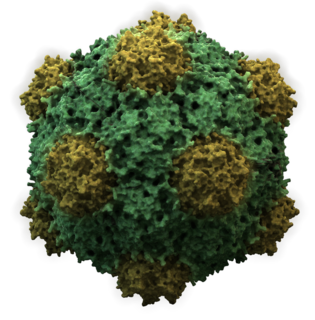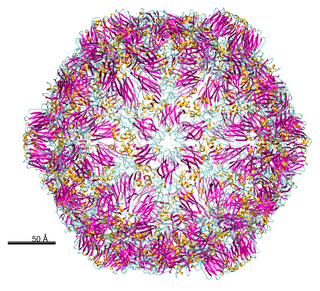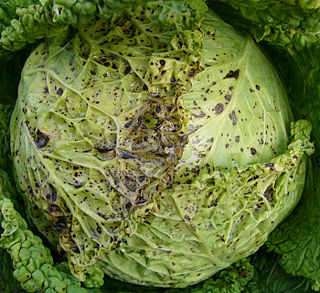
Comovirinae is a subfamily of viruses in the order Picornavirales, in the family Secoviridae; its genera were formerly classified in the family Comoviridae. Plants serve as natural hosts. There are currently 62 species in this subfamily, divided among 3 genera.

Lettuce mosaic virus (LMV) is a typical potyvirus, which causes one of the major virus diseases of lettuce crops worldwide.

Potyvirus is a genus of viruses in the family Potyviridae. Plants serve as natural hosts. There are currently 183 species in this genus including the type species Potato virus Y. The genus is named after the type virus. Potyviruses account for ~30% of the currently known plant viruses. Like begomoviruses, members of this genus may cause significant losses in agricultural, pastoral, horticultural and ornamental crops. More than 200 species of aphids spread potyviruses and most are from the subfamily Aphidinae.

Begomovirus is a genus of viruses, in the family Geminiviridae. They are plant viruses that as a group have a very wide host range, infecting dicotyledonous plants. Worldwide they are responsible for a considerable amount of economic damage to many important crops such as tomatoes, beans, squash, cassava and cotton. There are currently 424 species in this genus including the type species Bean golden yellow mosaic virus.

Nepovirus is a genus of viruses in the order Picornavirales, in the family Secoviridae, in the subfamily Comovirinae. Plants serve as natural hosts. There are currently 40 species in this genus including the type species Tobacco ringspot virus. Nepoviruses, unlike the other two genera in the subfamily Comovirinae, are transmitted by nematodes.

Alfalfa mosaic virus (AMV), also known as Lucerne mosaic virus or Potato calico virus, is a worldwide distributed phytopathogen that can lead to necrosis and yellow mosaics on a large variety of plant species, including commercially important crops. It is the only Alfamovirus of the Bromoviridae family. In 1931 Weimer J.L. was the first to report AMV in alfalfa. Transmission of the virus occurs mainly by some aphids, by seeds or by pollen to the seed.

Cymbidium mosaic virus (CymMV) is a plant pathogenic virus of the family Alphaflexiviridae.
Indian cassava mosaic virus(ICMV) is a plant pathogenic virus of the family Geminiviridae. It affects cassava in India and certain other countries. It is considered to be an invasive species.
Potato aucuba mosaic virus (PAMV) is a plant pathogenic virus of the family Alphaflexiviridae.
Potato yellow mosaic virus (PYMV) is a plant pathogenic virus of the family Geminiviridae.
Sowbane mosaic virus (SoMV) is a pathogenic plant virus, infecting potato and grapevine. Infected species present chlorotic mottling and lesions, followed by yellow flecking and star-shaped patterns.
Carlavirus, formerly known as the "Carnation latent virus group", is a genus of viruses in the order Tymovirales, in the family Betaflexiviridae. Plants serve as natural hosts. There are currently 53 species in this genus including the type species Carnation latent virus. Diseases associated with this genus include: mosaic and ringspot symptoms.

Myzus persicae, known as the green peach aphid, greenfly, or the peach-potato aphid, is a small green aphid belonging to the order Hemiptera. It is the most significant aphid pest of peach trees, causing decreased growth, shrivelling of the leaves and the death of various tissues. It is also acts as a vector for the transport of plant viruses such as cucumber mosaic virus (CMV), potato virus Y (PVY) and tobacco etch virus (TEV). Potato virus Y and potato leafroll virus can be passed to members of the nightshade/potato family (Solanaceae), and various mosaic viruses to many other food crops.

Secoviridae is a family of viruses in the order Picornavirales. Plants serve as natural hosts. There are currently 86 species in this family, divided among 8 genera or not assigned to a genus. The family was created in 2009 with the grouping of families Sequiviridae, now dissolved, and Comoviridae, now subfamily Comovirinae, along with the then unassigned genera Cheravirus, Sadwavirus, and Torradovirus.

Macrosiphum euphorbiae, the potato aphid, is a sap-sucking pest insect in the family Aphididae. It infests potatoes and a number of other commercially important crops.

Comovirus is a genus of viruses in the order Picornavirales, in the family Secoviridae, in the subfamily Comovirinae. Plants serve as natural hosts. There are currently 15 species in this genus including the type species Cowpea mosaic virus.
Mastrevirus is a genus of ssDNA viruses, in the family Geminiviridae. Mostly monocotyledonous plants serve as natural hosts. They are vectored by planthoppers. There are currently 41 species in this genus including the type species Maize streak virus. Diseases associated with this genus include: maize streak virus: maize streak disease (MSD).
Polerovirus is a genus of viruses, in the family Luteoviridae. Plants serve as natural hosts. There are currently 26 species in this genus including the type species Potato leafroll virus. Diseases associated with this genus include: PLRV causes prominent rolling of the leaves of potato and a stiff upright habit of the plants; necrosis of the phloem and accumulation of carbohydrates in the leaves.

Tymovirus is a genus of viruses in the order Tymovirales, in the family Tymoviridae. Plants serve as natural hosts. There are currently 28 species in this genus including the type species Turnip yellow mosaic virus.









